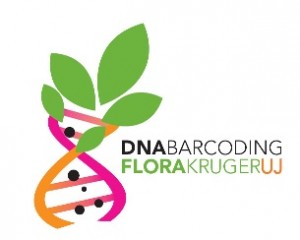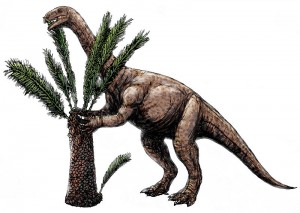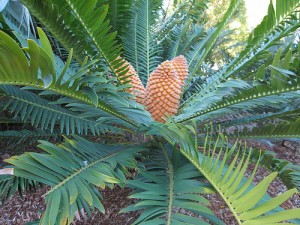Imagine having survived mass extinctions dating back to 300 million years ago and now becoming extinct in 2013. This is the story of cycads, the oldest seed plants. They resemble a combination between a fern and a prehistoric palm. Their ancient characteristics have given significant insights to scientists about the origin of plant species. Unfortunately,today,these plants have become a valuable prey to poachers, similar to other endangered animals around the world. Cycads are now on the global conservation agenda as their preservation is key to the development of plant biology.
Cycads have helped determine the age of flowering plants. For example, experimenters hypothesized that the reproductive structure of the cycads were wind pollinated. Subsequently, they compared several other cycads and concluded that most species were actually insect pollinated by beetles. Thus insect pollination is much older than the wind pollination of flowering plants. Without the discovery of these seed plants, the maturity of insect pollination would not have been determined.
Luckily their decline has now come to the attention of scientists. Philip Rousseau, a botany researcher at the University of Johannesburg, fears that wild cycads could become extinct. As shown on the map, South Africa is one of the many regions with a high distribution of cycads but now 31 percent of the species are disappearing. The current poaching rate could make them extinct in the wild by next year. Poachers have found malicious ways to find the plant by hunting at night and selling them during the day. Each tree can be sold for as much as $100,000 to various collectors in the black market. Farmers and landowners have called for bans and regulations for cycads before it gets out of control and existence.

Funding boost for DNA barcoding in South Africa
“Scientists and botanists at the University of Johannesburg (UJ) will benefit from a $2.2 million grant to fortify the research…”
Copyright University of Johannesburg
In order to regulate and preserve the cycads, the University of Johannesburg funded a scientific project in which they identified rare species using a DNA barcoding system. Researchers would take less than 1 gram of the plant’s DNA, crush it, treat it with chemicals and record its barcode. This would allow custom officials to check smugglers with a device reading the plant’s DNA. Lastly, the project would help the University of Guelph complete their International Bar Code of Life Project. Once again, the cycads would help determine the earth’s biodiversity.
The prehistoric age of Cycads is very valuable to science. However, it is now a valuable commodity to poachers like ivory or rhino horns. For this reason, a conservation plan is important to protect one of the key species to the history of plants. For sale or for history?
-Diane Mutabaruka



